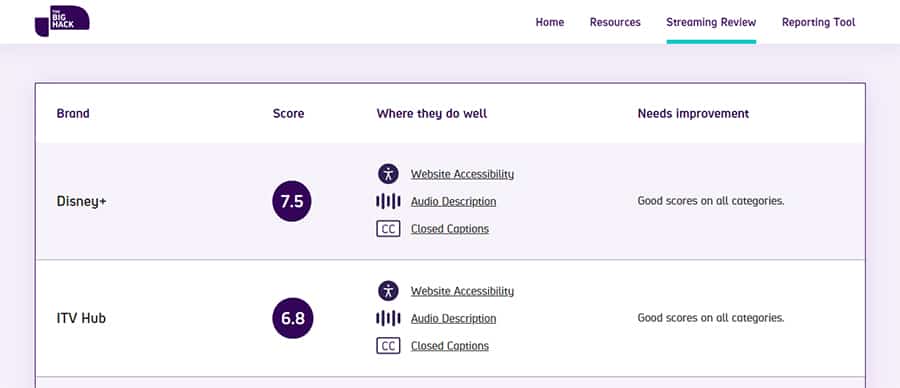Streaming services are failing disabled people, new league table reveals

Disability equality charity Scope is urging streaming service providers to improve their accessibility, after revealing the first league table of its kind showing how many major streaming services are failing disabled people.
After gathering data from the most popular services directly, Scope ranked each based on the percentage of content which had closed captions and audio descriptions and assessed its website accessibility.
Disney+, ITV Hub, All4 and BBC iPlayer received the highest scores, while Sky Go, Sky Store, Now TV and Google Play ranked poorly. Scope contacted each organisation at least twice and platforms were marked down if they failed to respond.
The full league table (scores out of 10) of accessible streaming services are:
- Disney+ – 7.5
- ITV Hub – 6.8
- All4 – 6.6
- BBC iPlayer – 6.3
- Amazon Prime Video – 5.9*
- Netflix – 5.8*
- BritBox – 4.7*
- My5 – 2.4
- NowTV – 2.4**
- Google Play – 2.0**
- Sky Go – 1.8**
- Sky Store – 0**
* = did not provide data on audio descriptions
** = did not provide data on either captions or audio descriptions
The live version of this table is available at: bighack.org/businesscase/streaming/
The charity, which has been engaging with the technology industry through its Big Hack programme, also carried out a survey which found the top five most common issues were: no captions (17 percent), poor captions (17 percent), bad navigation (15 percent), lack of trigger warnings (10 percent), lack of audio description (8 percent).
With many people continuing to stay home, Scope says it is concerned that disabled people are being ignored and forgotten by streaming platforms and is calling for all platforms to improve their accessibility.
Scope also wants to work with the UK Government and regulators to bring regulations into the 21st century, so disabled people aren’t left behind.
Scope has issued the call as part of its #WontBeForgotten campaign. The campaign is urging the UK Government, companies and the wider public to be more inclusive of the UK’s 14 million disabled people.
After surveying more than 3,000 disabled consumers, the disability equality charity found that four in five disabled people experienced accessibility issues with streaming services. In addition, 20 percent have cancelled or stopped using a streaming service because of accessibility issues.
Two thirds of users also reported feeling either frustrated, let down, excluded or upset by inaccessible entertainment.
To add to this, further research by Scope carried out by Savanta ComRes found 42 percent of disabled people have felt more isolated or lonely since the start of the lockdown and 57 percent are feeling more stressed or anxious.
Kristina Barrick, Head of Digital Influencing at Scope, said: “This is already a stressful time for disabled people, who are being hit hard by the effects of the pandemic. But as lockdown begins to ease for many, disabled people are still being locked out of the digital world by streaming platforms.
“Streaming and catch-up services can provide access to vital public health information and news, as well as the much-needed escapism we are all relying on in lockdown. Yet our research shows that many disabled people are feeling excluded by streaming platforms.
“Many of the most frustrating problems are inconsistencies, like not having captions or audio description on all episodes in a series. These kinds of issues make disabled people feel like an afterthought and excluded from modern day conversations that often centre around a series.
“We want streaming platforms and other businesses to work with us to make sure disabled people can enjoy their services instead of feeling forgotten.”
Ofcom regulations state that for most UK-based TV channels, 80 percent of content must be subtitled and 10 percent audio described. However, for on-demand (including catch-up) services, there is no legal requirement to provide access services.
Furthermore, while web-based services are supposed to comply with global minimum standards WCAG (web content accessibility guidelines), Scope’s Big Hack found that not all platforms meet these minimum standards.
In light of this, Scope says it would like to work with the government and regulators to bring these systems into the 21st century and make sure disabled customers are getting a good service.

